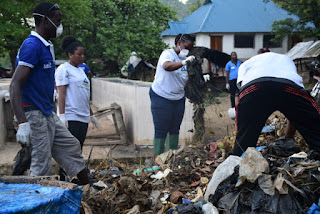Zara Charity Sponsors the Indian Ocean Coastline Clean up once again.
It is astonishing how much plastic washes up on our beaches. But that is just the tip of the iceberg in comparison to how much plastic must be in our oceans. Most of it isn’t thrown off ships but is dumped carelessly on land or in rivers and it is then blown or washed into the sea.
Ocean plastic is estimated to kill millions of marine animals every year. Nearly 700 species, including endangered ones, are known to have been affected by it. Some are harmed visibly—strangled by abandoned fishing nets or discarded six-pack rings. Many more are probably harmed invisibly. Marine species of all sizes now eat micro-plastics, the bits smaller than one-fifth of an inch across.
 As an advocate for Sustainable Tourism Development. Zara Charity alongside TESO and Zara Foundation took to the Indian Ocean Coastline in Tanga again earlier this November. The team engaged in a thorough clean up of the Coastline focusing in the area called Deep Sea. We were able to extract over 7 tons of waste 95% was plastic bags, 3% mineral water bottles and 2% other garbage.
As an advocate for Sustainable Tourism Development. Zara Charity alongside TESO and Zara Foundation took to the Indian Ocean Coastline in Tanga again earlier this November. The team engaged in a thorough clean up of the Coastline focusing in the area called Deep Sea. We were able to extract over 7 tons of waste 95% was plastic bags, 3% mineral water bottles and 2% other garbage.
Zara charity is proud to be a sponsor of this much needed call for action and is humbled to be able to part take in tackling one of the world’s greatest challenges; plastic pollution. In all our operations, we have embarked on a campaign to we recycle, reuse and reduce plastic in efforts to curb Plastic pollution and are at the frontline in raising awareness of the need to eliminate plastic waste across the country.
Join us to raise importance on the need to address biodiversity conservation and climate change by participating in our next Mt. Kilimanjaro volunteer clean up trek coming up in 2019
 Climate change is ultimately one of the biggest challenges of our generation. At Zara Tours we are committed to saving our natural resources and protecting them for future generations.
Climate change is ultimately one of the biggest challenges of our generation. At Zara Tours we are committed to saving our natural resources and protecting them for future generations.
The purpose of the clean up trek is to ensure the sustainability of Mt. Kilimanjaro.
The mountain is the primary source of water for domestic supply, agriculture and hydropower, food, fuel, non-timber forest products (including medicinal plants) and building materials for the people of Kilimanjaro region in northern Tanzania. It also provides economic and cultural benefits and is one of the major tourism attractions in Tanzania. Currently there is very little done to preserve its eco-system. The last three decades have seen a fluctuation in its famous glaciers and icecap greatly influenced by climatic conditions.
 As an advocate for Sustainable Tourism Development. Zara Charity alongside TESO and Zara Foundation took to the Indian Ocean Coastline in Tanga again earlier this November. The team engaged in a thorough clean up of the Coastline focusing in the area called Deep Sea. We were able to extract over 7 tons of waste 95% was plastic bags, 3% mineral water bottles and 2% other garbage.
Zara charity is proud to be a sponsor of this much needed call for action and is humbled to be able to part take in tackling one of the world’s greatest challenges; plastic pollution. In all our operations, we have embarked on a campaign to we recycle, reuse and reduce plastic in efforts to curb Plastic pollution and are at the frontline in raising awareness of the need to eliminate plastic waste across the country.
As an advocate for Sustainable Tourism Development. Zara Charity alongside TESO and Zara Foundation took to the Indian Ocean Coastline in Tanga again earlier this November. The team engaged in a thorough clean up of the Coastline focusing in the area called Deep Sea. We were able to extract over 7 tons of waste 95% was plastic bags, 3% mineral water bottles and 2% other garbage.
Zara charity is proud to be a sponsor of this much needed call for action and is humbled to be able to part take in tackling one of the world’s greatest challenges; plastic pollution. In all our operations, we have embarked on a campaign to we recycle, reuse and reduce plastic in efforts to curb Plastic pollution and are at the frontline in raising awareness of the need to eliminate plastic waste across the country.
 As an advocate for Sustainable Tourism Development. Zara Charity alongside TESO and Zara Foundation took to the Indian Ocean Coastline in Tanga again earlier this November. The team engaged in a thorough clean up of the Coastline focusing in the area called Deep Sea. We were able to extract over 7 tons of waste 95% was plastic bags, 3% mineral water bottles and 2% other garbage.
As an advocate for Sustainable Tourism Development. Zara Charity alongside TESO and Zara Foundation took to the Indian Ocean Coastline in Tanga again earlier this November. The team engaged in a thorough clean up of the Coastline focusing in the area called Deep Sea. We were able to extract over 7 tons of waste 95% was plastic bags, 3% mineral water bottles and 2% other garbage.  Climate change is ultimately one of the biggest challenges of our generation. At Zara Tours we are committed to saving our natural resources and protecting them for future generations.
The purpose of the clean up trek is to ensure the sustainability of Mt. Kilimanjaro.
Climate change is ultimately one of the biggest challenges of our generation. At Zara Tours we are committed to saving our natural resources and protecting them for future generations.
The purpose of the clean up trek is to ensure the sustainability of Mt. Kilimanjaro.
 Climate change is ultimately one of the biggest challenges of our generation. At Zara Tours we are committed to saving our natural resources and protecting them for future generations.
Climate change is ultimately one of the biggest challenges of our generation. At Zara Tours we are committed to saving our natural resources and protecting them for future generations. 



Comments
Post a Comment